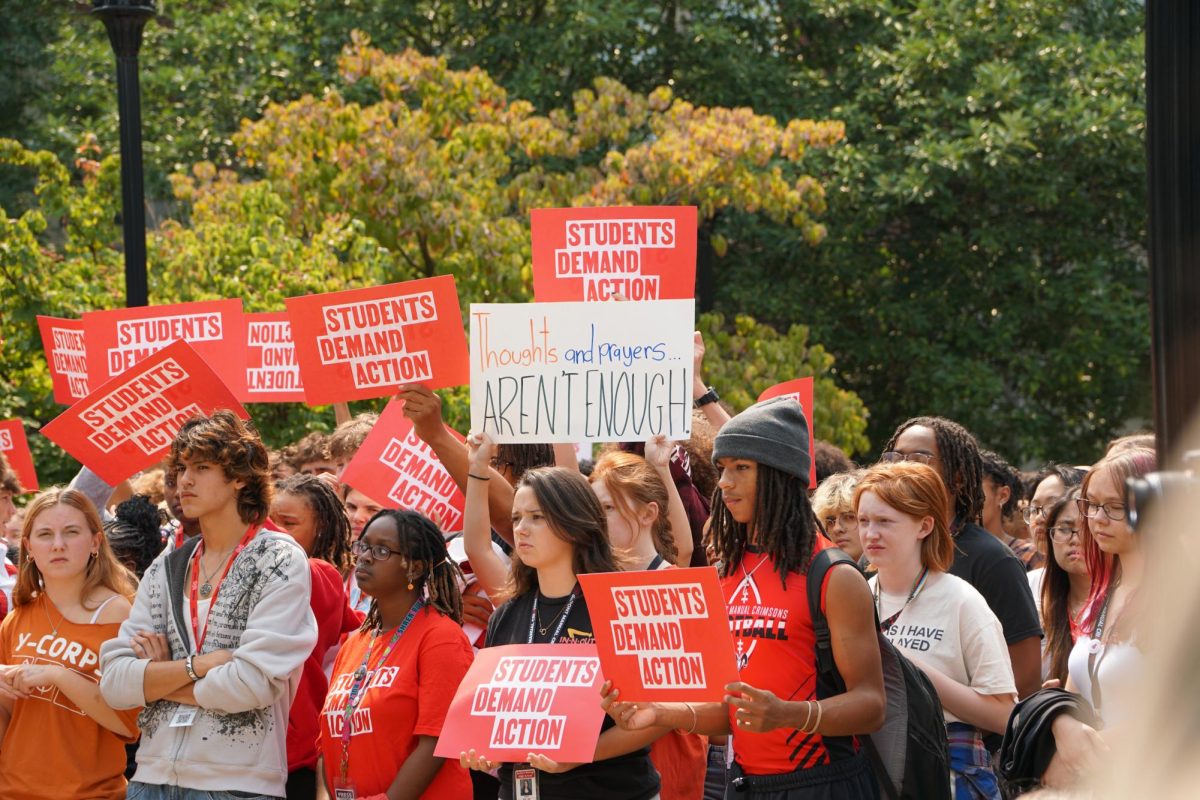According to a 2019 Stanford study, two-thirds of students tested couldn’t distinguish editorial content and advertising, and 96% didn’t comprehend why a climate-change website supported by a fossil fuel company might be questionable.
Governor Gavin Newsom signed Assembly Bill 873 in October 2023 in an effort to reverse those dismal trends. The law mandates that teachers incorporate media literacy guidance in California’s K-12 schools beginning next school year. The content — taught in existing English, math, science and history-social studies curricula rather than as a stand-alone class — would teach students how to identify fake news in their online searches and instruct them on what to do if they come across it.
“It’s great to reinforce the importance of properly analyzing a text and knowing if you can believe what you are reading,” said English 3 and Advanced Placement Language teacher Shane Karshan. “That is such an important skill to have in humanities and even science and math classes.”
In the past, California has implemented several laws regarding media literacy. Senate Bill 830, for example, requires the California Department of Education to provide teachers with resources to teach media literacy. Nevertheless, none go as far as the newest bill, which explicitly requests the teaching of media literacy.
Perhaps the main incentive prompting more significant efforts to educate students about media literacy is the current rise in misinformation, a phenomenon that is essentially due to the development of artificial intelligence (AI). According to NewsGuard, a fake news tracking organization, the number of websites carrying AI-generated false information has surged by more than 1,000% since May 2023, from 49 sites to over 600.
Fake news has real consequences. For instance, consider the 2020 presidential elections, when some states allowed voting by mail because of the Covid-19 outbreak. Since there was a lack of public awareness about the voting process, false assertions were propagated that mail voting would result in fraud. Today, we know that former president Donald Trump, along with others, disseminated these untrue statements in an effort to contest the results of the 2020 presidential election. Such stories are common, and continue to erode trust in the validity of the 2024 presidential election.
“From now on, our political elections will be using AI in so many more ways,” said sophomore and president of the AI club Serena Koopmans. “AI has the potential to influence the opinions of so many people and if it’s spreading misinformation, it’s doing it in the wrong way. That’s why it’s important to double-check your sources and make sure that the information you read is relevant and diverse.”
Even outside of school, Karshan has always enjoyed clicking on a site, reading the “About Us” section and trying to identify its biases. In class, he shares those skills with his students when writing research papers. For instance, Karshan teaches them about using .edu versus .com websites and specific ways to compose Google searches that are more likely to produce targeted and unbiased information. Similarly, English 4 teacher and journalism advisor Melissa Murphy takes time with her students to look at several different types of websites and analyze whether they are credible and usable in an academic setting.
“It’s like a treasure hunt,” Karshan said. “I love trying to find whether a site is reliable or if they are biased… but beyond fun, it’s important. If we think we’re getting an unbiased perspective on a topic and we’re not, then that hurts us, no matter which way.”
However, the English Department is a busy one, and they have numerous other important issues to focus on. For instance, they have prioritized rubrics, the four-point scale, language used around writing, and diversity, equity and inclusion.
“We have really been focusing on other things for the last three to four years so media literacy, unfortunately, seems to be at the bottom of the list,” Murphy said. “It’s not to say it isn’t important, because it is. But this is a matter of how much time we have and what that looks like when we can’t fit something in, which is really frustrating.”
Murphy stresses the importance of media literacy in her senior classes largely because she also teaches journalism, a field where media literacy is constantly relevant. News organizations must abide by a code of ethics, which differentiates them from blogs. According to Murphy, readers are not always aware of that, so they incorrectly assume publications are promoting fake news.
“Journalists are part of our democracy and an important part of keeping our politicians accountable, and if we lose our credibility or the media’s credibility, then that is a really scary situation,” Murphy said. “That’s why the media literacy conversation is always at the forefront of journalism.”
However, the responsibility to teach media literacy skills does not only rest with teachers. Koopmans has been working on ways to educate her community about AI-related matters, giving them the confidence to identify and use AI in a responsible way.
“Many people know what the problems are, but they don’t exactly know how to approach them,” Koopmans said. “That’s kind of what we are doing with our teacher resource and student workshop because we don’t want people using AI without any education on how to be responsible with it. If they get access to all of this knowledge, they will certainly also have media literacy skills because they know what is trustworthy and what is not.”
Thanks to Assembly Bill 873, it’s become required for media literacy knowledge to be taught. However, according to Murphy, that’s not enough. Teachers have done their part; now, it is up to students to apply their media literacy abilities to their everyday circumstances in addition to schoolwork.
“In an academic setting, I feel like kids do really well [with media literacy,]” Murphy said. “Now whether they are using those skills when they are flipping through their Snapchat and seeing news stories, I can’t exactly pinpoint that. So we also have to encourage them in that sense, they have the skills and now they just need to use it in the real world.”
This story was originally published on The Burlingame B on February 16, 2024.






































